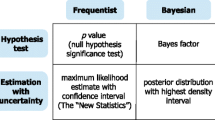Abstract
This paper studies the use of hypotheses schemes in generatinginductive predictions. After discussing Carnap–Hintikka inductive logic,hypotheses schemes are defined and illustrated with two partitions. Onepartition results in the Carnapian continuum of inductive methods, the otherresults in predictions typical for hasty generalization. Following theseexamples I argue that choosing a partition comes down to making inductiveassumptions on patterns in the data, and that by choosing appropriately anyinductive assumption can be made. Further considerations on partitions makeclear that they do not suggest any solution to the problem of induction.Hypotheses schemes provide the tools for making inductive assumptions, but theyalso reveal the need for such assumptions.
Similar content being viewed by others
REFERENCES
Bacchus, F., H. E. Kyburg Jr., and M. Thalos: 1990, 'Against Conditionalization', Synthese 85, 475–506.
Billingsley, P.: 1995, Probability and Measure, John Wiley & Sons, New York.
Bogdan, R.: 1976, Local Induction, D. Reidel, Dordrecht.
Carnap, R.: 1950, The Logical Foundations of Probability, University of Chicago Press, Chicago.
Carnap, R.: 1952, The Continuum of Inductive Methods, University of Chicago Press, Chicago.
Carnap, R. and R. Jeffrey (eds.): 1971, Studies in Inductive Logic and Probability,Vol.1, University of California Press, Berkeley.
Carnap, R. and W. Stegmüller: 1959, Inductive Logik und Wahrscheinlichkeit, Springer Ver l a g, Wi e n.
Chihara, M.: 1987, 'Some Problems for Bayesian Confirmation Theory', British Journal for the Philosophy of Science 38, 551–560.
Costantini, D.: 1979, 'The Relevance Quotient', Erkenntnis 14, 149–157.
De Finetti, B.: 1964, 'Foresight: its Logical Laws, its Subjective Sources', in H. Kyburg and H. Smokler (eds.), Studies in Subjective Probability, John Wiley & Sons, New York, pp. 97–158.
De Finetti, B.: 1972, Probability, Induction and Statistics, John Wiley & Sons, New York.
Earman, J.: 1992, Bayes or Bust, MIT Press, Cambridge, MA.
Festa, R.: 1993, Optimum Inductive Methods, Kluwer Academic Publishers, Dordrecht.
Gaifman, H. and M. Snir: 1982, 'Probabilities over Rich Languages', Journal of Symbolic Logic 47, 495–548.
Goodman, N.: 1955, Fact, Fiction, and Forecast, Harvard University Press, Cambridge, MA.
Hintikka, J.: 1966, 'A Two-Dimensional Continuum of Inductive Methods', in J. Hintikka and P. Suppes (eds.), Aspects of Inductive Logic, North Holland Publishing Company, Amsterdam.
Hintikka, J.: 1970, 'Unknown Probabilities, Bayesianism, and De Finetti's Representation Theorem', in R. C. Buck and R. S. Cohen (eds.), Boston Studies in the Philosophy of Science, Vol. VIII, D. Reidel, Dordrecht.
Hintikka, J.: 1997, 'Comment on Theo Kuipers', in M. Sintonen (ed.), Knowledge and Inquiry, Rodopi, Amsterdam.
Hintikka, J. and I. Niiniluoto: 1976, 'An Axiomatic Foundation of the Logic of Inductive Generalization', in M. Przelecki, K. Szaniawski, and R. Wójcicki (eds.), Formal Methods in the Methodology of the Empirical Sciences, Synthese Library 103, Dordrecht.
Howson, C.: 1973, 'Must the Logical Probability of Laws be Zero?', British Journal of Philosophy Science 24, 153–182.
Howson, C. and P. Urbach: 1989, Scientific Reasoning, The Bayesian Approach,Open Court Publishing Company, La Salle, IL.
Howson, C.: 2000, Hume's Problem, Clarendon Press, Oxford.
Jeffrey, R.: 1977, 'Mises Redux', in R. E. Butts and J. Hintikka (eds.), Problems in Methodology and Linguistics, Kluwer Academic Publishers, Dordrecht.
Jeffrey, R.: 1984, Probability and the Art of Judgement, Cambridge University Press, Cambridge.
Jeffreys, H.: 1939, Scientific Inference, Cambridge University Press, Cambridge.
Kelly, K.: 1997, 'Learning Theory and the Philosophy of Science', Philosophy of Science 64, 245–267.
Kemeny, J.: 1963, 'Carnap's Theory of Probability and Induction', in P. A. Schilpp (ed.), The Philosophy of Rudolph Carnap, Open Court Publishers, La Salle, IL.
Kuipers, T. A. F.: 1978, Studies in Inductive Probability and Rational Expectation,D. Reidel, Dordrecht.
Kuipers, T. A. F.: 1984, 'Two Types of Inductive Analogy by Similarity', Erkenntnis 21, 63–87.
Kuipers, T. A. F.: 1988, 'Inductive Analogy by Similarity and Proximity', in D. H. Helman (ed.), Analogical Reasoning, Kluwer Academic Publishers, Dordrecht, pp. 299–313,.
Kuipers, T. A. F.: 1997, 'The Carnap-Hintikka Programme in Inductive Logic', in M. Sintonen (ed.), Knowledge and Inquiry, Rodopi, Amsterdam.
Niiniluoto, I.: 1976, 'Inquiries, Problems, and Questions: Remarks on Local Induction', in R. Bogdan (ed.), Local Induction, D. Reidel, Dordrecht.
Niiniluoto, I.: 1981, 'Analogy and Inductive Logic', Erkenntnis 16, 1–34.
Norton, J. D.: 2003, 'A Material Theory of Induction', Philosophy of Science 70(October), 647–670.
Peirce, C.: 1934, Collected Papers, Vol. 5, Harvard University Press, Cambridge, MA.
Putnam, H.: 1963, 'Degree of Confirmation and Inductive Logic', in P. A. Schilpp (ed.) The Philosophy of Rudolf Carnap, Open Court Publishing Company, La Salle, IL, reprinted in H. Putnam: 1975, Mathematics, Matter and Method, Cambridge University Press, Cambridge, pp. 270–292.
Putnam, H.: 1963, 'Probability and Confirmation', The Voice of America 10, reprinted in Mathematics, Matter and Method, 1975, Cambridge University Press, Cambridge, pp. 293–304.
Skyrms, B.: 1991 'Carnapian Inductive Logic for Markov Chains', Erkenntnis 35, 439–460.
Skyrms, B.: 1996, 'Bayesian Projectability', in D. Stalker (ed.), Grue!, Open Court Publishers, La Salle, IL.
Stalker, D.: 1996, Grue!, Open Court Publishers, La Salle, IL.
Stegmüller, W.: 1973, Carnap II: Normatieve Theorie des Inductiven Räsonierens,PartC, Volume IV, Springer Verlag, Berlin.
Tuomela, R.: 1966, 'Induction in Ordered Universes', in J. Hintikka and P. Suppes (eds.), Aspects of Inductive Logic, North Holland Publishers, Amsterdam.
Van Fraassen, B. C.: 1989, Laws and Symmetry, Clarendon Press, Oxford.
Rights and permissions
About this article
Cite this article
Romeyn, J.W. Hypotheses and Inductive Predictions. Synthese 141, 333–364 (2004). https://doi.org/10.1023/B:SYNT.0000044993.82886.9e
Issue Date:
DOI: https://doi.org/10.1023/B:SYNT.0000044993.82886.9e




